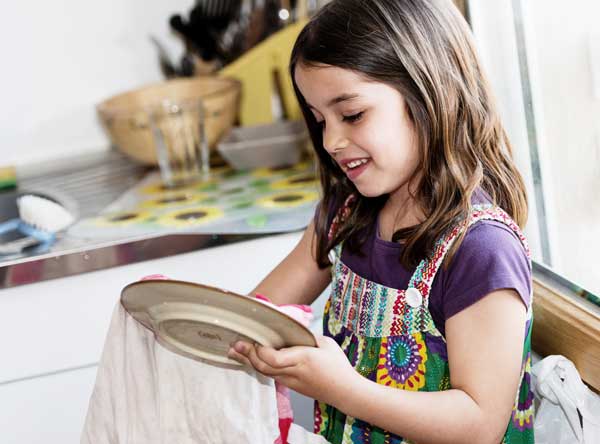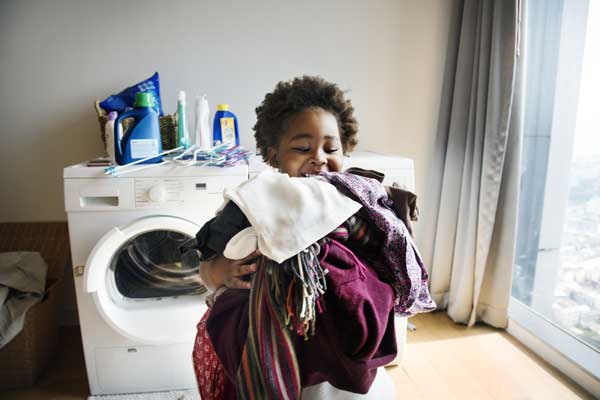Chores are a necessary part of life. The laundry won’t fold itself. The dishes need to be washed. Lunches must be packed. The rubbish needs to be put outside. Here in Qatar, many of us are lucky to have a maid or nanny to help with some tasks, but there are always other things that we need to be responsible for. And that’s what chores really are—a responsibility.

A great friend and the head of Early Years at a British primary school reminded me recently that chores should be seen in a positive light. Rather than being a negative part of our day, we can make them fun. We should also take time to emphasise to our children why chores are important and highlight the skills they can develop through doing them.
Getting started
Julie Bulow, head of Primrose Nursery in Al Waab, believes that children as young as toddlers can be encouraged to do simple chores. This will help children feel important and will support their well-being. Young children should be encouraged to help with chores at home before they enter the classroom.
However, the process of selecting chores should be ongoing as children age through primary and secondary schools. Parents need to adjust task lists and complexity as children mature. Teenagers who regularly do essential chores throughout their childhood will be better prepared for university and leaving home.
Not chores, but responsibilities
We all moan about chores, and since becoming parents it seems like our list of chores is never-ending, so how do we encourage our children to do chores when we may struggle ourselves? Decide which tasks are important and make a list or schedule, communicate your expectations and make sure your children understand that these are their responsibilities as family members. Even better, have your children help select a list of appropriate chores. Allow them to take ownership early in the process.
When children are very young you should help them with chores and make them fun. You could use a reward chart, challenge them to finish their task within a set amount of time or pick up toys of certain colours first. It is also important to focus on the result and give children clear reasons why they need to complete tasks. For example, we are clearing up the floor so you can play with toys.
Setting them up for success
With certain chores, however, you need to give children the time to do them alone or with minimal assistance. Children develop self-confidence by doing things for themselves. It is important to encourage children to get dressed with minimal assistance, eat independently, and clean up after themselves (e.g. putting rubbish in the bin).
As children grow up, it is important to emphasise that doing chores is part of family life. If everyone helps out, things get done faster. If family members take responsibility for themselves and do what is expected of them, trust is developed, children are allowed more independence and there is less nagging all round!

Age-appropriate chores
Ages 3-4
- Tidy up toys
- Put dirty clothes in the laundry basket
- Set the table
- Throw away rubbish
Ages 5-7
- Tidy room and make their bed
- Sort the recycling
- Help put away groceries
- Water plants
- Write shopping and chore lists
Ages 8-12
- Load and empty the dishwasher
- Help make packed lunches
- Fold and put away clothes
- Tend the garden
Ages 13 and up
- Help with meal preparation
- Put bins out
- Iron clothes
- Clean kitchen and bathroom
Whose chore is it?
Ask any group of parents or teachers what chores children should be doing and you will get lots of different responses. The chores you expect your children to do depend on the maturity of your child. It is a good idea to make the decision by considering the physical and cognitive developmental age of your child. Ask your children’s teachers what is expected of them in class and use that to help you come up with a list of related tasks. For older children, it may be helpful to play to their strengths by involving teenagers in selecting their tasks and setting a chore schedule.
The benefits of chores
- Responsibility. Chores teach children the importance of taking responsibility for themselves and their things
- Teamwork. When you help children with chores or they do chores together with siblings or classmates, they develop social and teamwork skills which will help them in the future
- Perseverance. Children that regularly do chores learn how to persevere when faced with challenges and are increasingly self-disciplined, self-confident, responsible and sociable
- Learning. Being able to complete tasks, including chores, helps children learn at school. Chores help children develop and improve social skills and gross and fine motor skills and make it easier for them to progress in literacy and numeracy
- Independence. A child’s ability to do chores is often reflected at school with children having better-developed skills and being more helpful in the classroom
- Time management. Chores can help kids to learn to multitask and develop time management skills



